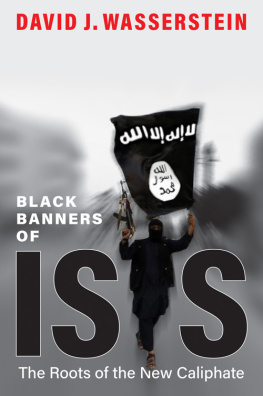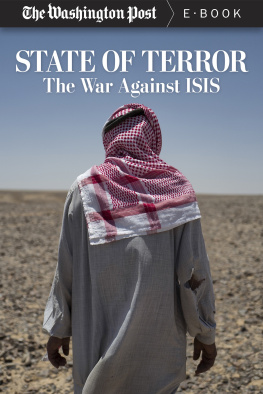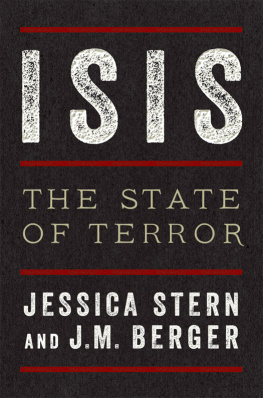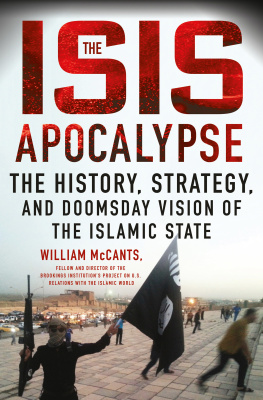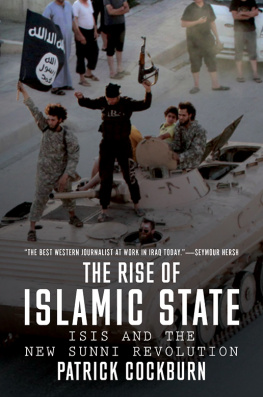INDEX OF PERSONAL NAMES
Numbers in bold refer to images
Abraham (prophet)
Abu Loth (escort in IS )
Abu Mariam ( IS fighter)
Abu Qatadah, see also
Abu Usama al-Gharib, see also
Achromejew, Sergei (Marshal)
Adnani, Abu Mohammad al- (spokesperson for IS )
Ahmad ( IS fighter)
Ahmed ( IS fighter)
Allende, Salvador
Almani, Abu Talha al-, see also
Assad, Bashar al
Aylwin, Patricio (Chilean politician)
Baghdadi, Abu Abdullah al-Rashid
Baghdadi, Abu Bakr al- (head of IS )
Barre, Siad
Barzani, Masud
Baudicour, Louis de
Baumann, Thomas
Begin, Menachem
Berg, Nicholas (executed U.S. hostage)
Bilal (prayer caller)
bin Laden, Osama
Blair, Tony
Brandt, Willy
Breivik, Anders
Brezhnev, Leonid
Burak (German IS fighter)
Bush, George W.
Cameron, David
Cantlie, John (British correspondent kidnapped by IS )
Carter, Jimmy
Cheney, Dick
Christian E., see also Abu Qatadah
Churchill, Winston
Clark, Wesley
David (King)
Deso Dogg, see also
Einstein, Albert
Flynn, Michael
Foley, James (executed U.S. journalist)
Gaddafi, Muammar al
Gandhi, Indira
Gandhi, Mahatma
Gauck, Joachim
Genghis Khan (Mongol leader)
Glucksmann, Andr
Goto, Kenji (executed Japanese journalist)
Habash, George
Hackensberger, Alfred
Hashim, Hasan Mohammad ( IS prisoner)
Hitler, Adolf
Hugo, Victor
Huntington, Samuel
Hussein (friend of the author)
Hussein, Saddam
Jesus
Jihadi John ( IS terrorist)
Julani, Abu Mohammad al- (leader of Jabhat al-Nusra)
Karzai, Hamid
Kassig, Peter
Kissinger, Henry
Krabbe, Gnter
Kujat, Harald
Maliki, Nouri al
Manal (U.S. Iraqi prisoner)
Masri, Abu Ayyub al- ( ISI leader)
Melek, Abdul
Merkel, Angela
Messi, Lionel
Mohamed Mahmoud, see also
Montalva, Eduardo Frei (Chilean politician)
Moses (prophet)
Muhajir, Abu Abdullah al- ( IS extremist ideologue)
Muhammad (Prophet)
Mullah Omar
Nasrallah, Hassan
Noah (prophet)
Nur ad-Din (Syrian regent)
Obama, Barack
Peck, Edward
Philip B. (German suicide bomber)
Pinker, Steven
Pinochet, Augusto
Pohl, Ines
Pol Pot
Powell, Colin
Rami ( IS fighter)
RamiAlLolah
Reagan, Ronald
Ribry, Franck
Robben, Arjen
Robert B. (German soldier, convert)
Ronaldo, Cristiano
Rumsfeld, Donald
Salah ad-Din (Saladin) (liberator of Jerusalem)
Salim (foreign fighter)
Sartre, Jean-Paul
Scholl-Latour, Peter
Shamir, Yitzhak
Sherbini, Marwa el- (Muslim murdered in Germany)
Siddiqui, Aafia (Pakistani terror suspect)
Solana, Javier
Sotloff, Steven
Stalin, Joseph
Steinmeier, Frank-Walter
Tocqueville, Alexis de
Todenhfer, Franoise
Todenhfer, Nathalie
Todenhfer, Valerie
Ustinov, Peter
Vogel, Pierre (Salafi)
Westergaard, Kurt (Danish cartoonist)
Yukawa, Haruna (executed Japanese hostage)
Zarqawi, Abu Musab al- (Iraqi terrorist, member of al-Qaeda)
Zawahiri, Ayman al- (bin Ladens representative)
MY JOURNEY
INTO THE HEART
OF TERROR
Ten Days in
the Islamic State
Jrgen Todenhfer
Translated by A.O. May
Copyright 2016 by Jrgen Todenhfer
Translation copyright 2016 by A.O. May
All photographs copyright 2016 by Frederic Todenhfer,
except photographs 17 and 47, which are taken from IS videos
Maps copyright 2016 by Peter Palm, Berlin
Originally published in Germany as Inside IS by C. Bertelsmann Verlag in 2015
All rights reserved. No part of this book may be reproduced, stored in a retrieval system or transmitted, in any form or by any means, without the prior written consent of the publisher or a license from The Canadian Copyright Licensing Agency (Access Copyright). For a copyright license, visit accesscopyright.ca or call toll free to 1-800-893-5777.
Greystone Books Ltd.
greystonebooks.com
Cataloguing data available from Library and Archives Canada
ISBN 978-1-77164-224-8 (cloth)
ISBN 978-1-77164-225-5 (epub)
Editing by A.O. May
Copyediting by Shirarose Wilensky
Cover design by Peter Cocking
Cover photo collage by Frederic Todenhfer
We gratefully acknowledge the financial support of the Canada Council for the Arts, the British Columbia Arts Council, the Province of British Columbia through the Book Publishing Tax Credit, and the Government of Canada through the Canada Book Fund for our publishing activities.
For Frederic, who made a huge contribution to the journey and to the development of this book. Without him this book would not exist.
Introduction
IN THE MANY court cases I have been involved in, first as a junior lawyer and later in my short time as a judge, I often found myself on an emotional roller coaster. After the prosecutors arguments, I usually thought the accused was a scheming scoundrel. But as soon as the defense made its case, everything looked completely different. I was all for leniency. Assessing who was right and to what extent were the most difficult decisions of my life. One side is hardly ever completely without fault, and there are almost always arguments in favor of the other side. Rarely did I feel that the final decision was absolutely correct.
The lesson I took from this was that if you want to find the truth, you must speak to both sides. Even when the world has already pronounced its judgment. An important principle of Roman law is audiatur et altera pars (listen to the other side). So in the eighties, I spent time with different groups of mujahideen in what was then Soviet-occupied Afghanistan. Then I spoke twice with Marshal Sergei Achromejew, the head of the Soviet military in Moscow, even though the Soviet government had publicly declared that if they caught me, they would have me flogged and then shot. For hours we discussed whether it would not be smarter for the Soviet Union to withdraw from Afghanistan. Achromejew was a very open man and he knew how to listen.
It was Easter 1975 when I met with the Chilean dictator Augusto Pinochet in Punta Arenas to negotiate the release of 4,500 political prisoners, most of whom were Marxists. But I was also there to understand the situation in Chile after the fall of Salvador Allende. After meeting with Pinochet, I flew to the capital, Santiago, to speak with the leaders of the opposition, the Christian Democrats Eduardo Frei Montalva and Patricio Aylwin. Back in Germany, I was subjected to a torrent of abuse for my attempt to build an objective picture of the situation. I was labeled a supporter of dictatorships. Even though many thousands of prisoners were later set free, this did not change the fact that for many years I was drowned out at large events by the chants of furious crowds waving banners depicting Pinochet.
Despite this, in my search for the truth I stuck with my strategy of speaking with both sides whenever possible. Mostly this strategy garnered indignant protests from those who pass judgment on the world from the comfort of their armchairs and are convinced that they alone are in possession of the truth. I spoke on numerous occasions with Hamid Karzai, the president of Afghanistan, but I also spoke with leaders of the Afghan Taliban. For countless deskbound strategists, such as the former chief of staff of the German armed forces Harald Kujat, I was from then on the mouthpiece of the Taliban. For others I was quite simply a terrorist sympathizer.


